口译专题——迎来送往 参考译文
- 格式:doc
- 大小:15.00 KB
- 文档页数:3
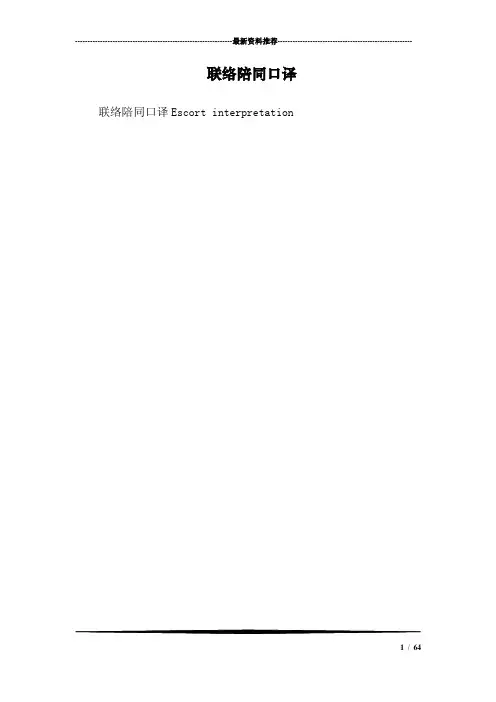
---------------------------------------------------------------最新资料推荐------------------------------------------------------联络陪同口译联络陪同口译Escort interpretation1/ 64Escort interpretation? ?Based on memory training; don’t take notesEmphasize the importance of preparation before interpreting i) Predict what words or expressions are likely to be used by speakers on certain occasion; try to get familiar with those expressions Collect background information?? ii)---------------------------------------------------------------最新资料推荐------------------------------------------------------ 联络陪同口译任务:在接待、旅游等事务中担任口译。
要求: 1.强烈的责任感。
2. 广博的知识3. 跨文化交际意识4. 仪态自然大方3/ 641.强烈的责任感准确把握工作的时间和场所。
大量细致的准备工作:了解接待客人的身份、爱好、特点等背景信息和客人活动的内容等。
2. 广博的知识谈话内容更随意、灵活---------------------------------------------------------------最新资料推荐------------------------------------------------------ 3.跨文化交际意识 1. “您长途飞行,一路上一定很累吧?” You must have been very tired after the long flight?I hope you have had a smooth flight.√2. 指令、禁语“请注意” Attention, please! Ladies and gentlemen, may I have your attention, please? √ 3. 谦让语“这没什么,是我应该做的” “哪里,哪里” “我做得不够好”5/ 644.仪态自然大方掌握外事活动中基本的行为规范:遵时守约、着装规范仪容整洁、态度亲切言语得体、注重礼仪---------------------------------------------------------------最新资料推荐------------------------------------------------------ Major Fields:1 2 3 4 5迎来送往、宾馆入住礼仪祝辞(演讲口译)餐饮文化(宴会口译)换币购物(购物陪同口译)景点游玩(导游陪同口译)7/ 64(一)迎来送往、宾馆入住Meeting and Seeing-off Check in---------------------------------------------------------------最新资料推荐------------------------------------------------------ Phrases Interpreting? ? ? ? ? ? ? Recover from the jet lag Thoughtful Arrangement Hospitability Souvenir Accommodations Claim baggage Proceed through the customs Itinerary Farewell speech Adjust to the time difference? ? ? ? ? ? ? ? ? ?倒时差周到的安排热情好客纪念品食宿提取行李进行海关检查活动安排告别辞适应时差? ? ?9/ 64? ? ? ? ? ? ? ? ? ?为……设宴洗尘向……告别不远万里来到… 您先请久仰大名欢迎辞赞美回顾过去展望未来慢走? ? ? ? ? ? ??? ?to hold a banquet in honor of…. to bid farewell to …. Come all the way to…. After you! I have long been looking forward to meeting you. a welcoming address to pay tribute to …. Looking back; Looking ahead Take care!---------------------------------------------------------------最新资料推荐------------------------------------------------------ Titles首席长官称谓常以“总”表示,与之相对应的英语词有:chief, general, head, managing等 e.g. 总工程师 chief engineer 总代理 general agent 总教练 head coach11/ 64汉语中表示副职的头衔常以“副”字表示,英语词:vice, associate, assistant, deputy 等有相同作用。
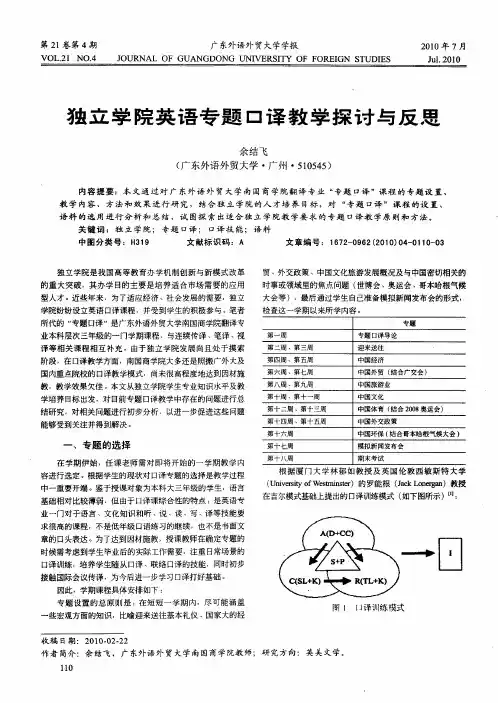
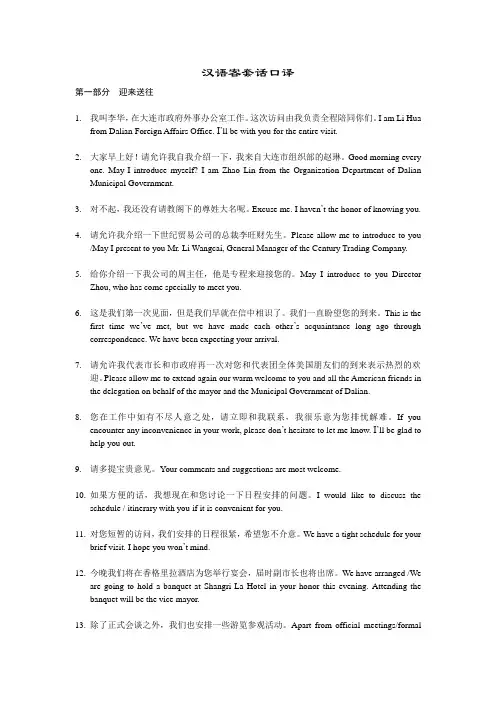
汉语客套话口译第一部分迎来送往1.我叫李华,在大连市政府外事办公室工作。
这次访问由我负责全程陪同你们。
I am Li Huafrom Dalian Foreign Affairs Office. I’ll be with you for the entire visit.2.大家早上好!请允许我自我介绍一下,我来自大连市组织部的赵琳。
Good morning everyone. May I introduce myself? I am Zhao Lin from the Organization Department of Dalian Municipal Government.3.对不起,我还没有请教阁下的尊姓大名呢。
Excuse me. I haven’t the honor of knowing you.4.请允许我介绍一下世纪贸易公司的总裁李旺财先生。
Please allow me to introduce to you/May I present to you Mr. Li Wangcai, General Manager of the Century Trading Company.5.给你介绍一下我公司的周主任,他是专程来迎接您的。
May I introduce to you DirectorZhou, who has come specially to meet you.6.这是我们第一次见面,但是我们早就在信中相识了。
我们一直盼望您的到来。
This is thefirst time we’ve met, but we have made each other’s acquaintance long ago through correspondence. We have been expecting your arrival.7.请允许我代表市长和市政府再一次对您和代表团全体美国朋友们的到来表示热烈的欢迎。
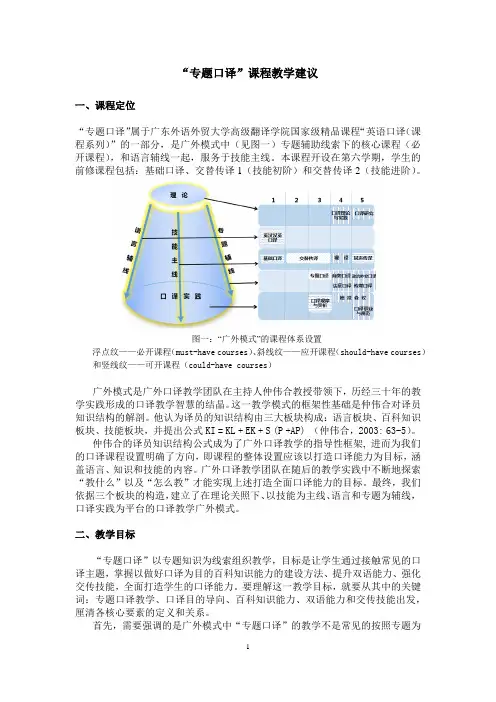
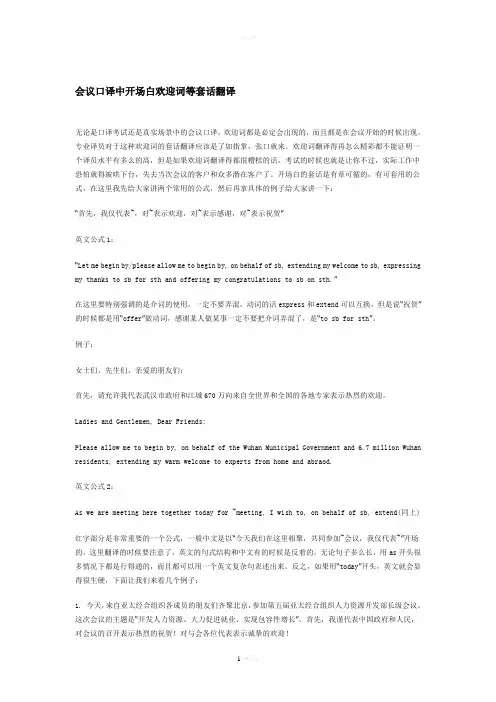
会议口译中开场白欢迎词等套话翻译无论是口译考试还是真实场景中的会议口译,欢迎词都是必定会出现的,而且都是在会议开始的时候出现。
专业译员对于这种欢迎词的套话翻译应该是了如指掌,张口就来。
欢迎词翻译得再怎么精彩都不能证明一个译员水平有多么的高,但是如果欢迎词翻译得都很糟糕的话,考试的时候也就是让你不过,实际工作中恐怕就得被哄下台,失去当次会议的客户和众多潜在客户了。
开场白的套话是有章可循的,有可套用的公式,在这里我先给大家讲两个常用的公式,然后再拿具体的例子给大家讲一下:“首先,我仅代表~,对~表示欢迎,对~表示感谢,对~表示祝贺”英文公式1:“Let me begin by/please allow me to begin by, on behalf of sb, extending my welcome to sb, expressing my thanks to sb for sth and offering my congratulations to sb on sth.”在这里要特别强调的是介词的使用,一定不要弄混,动词的话express和extend可以互换,但是说“祝贺”的时候都是用“offer”做动词,感谢某人做某事一定不要把介词弄混了,是“to sb for sth”。
例子:女士们、先生们、亲爱的朋友们:首先,请允许我代表武汉市政府和江城670万向来自全世界和全国的各地专家表示热烈的欢迎。
Ladies and Gentlemen, Dear Friends:Please allow me to begin by, on behalf of the Wuhan Municipal Government and 6.7 million Wuhan residents, extending my warm welcome to experts from home and abraod.英文公式2:As we are meeting here together today for ~meeting, I wish to, on behalf of sb, extend(同上)红字部分是非常重要的一个公式,一般中文是以“今天我们在这里相聚,共同参加~会议,我仅代表~”开场的。
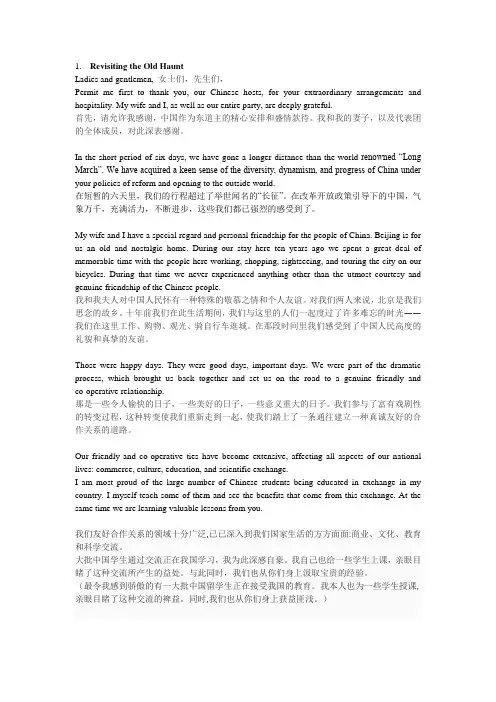
1.Revisiting the Old HauntLadies and gentlemen,女士们,先生们,Permit me first to thank you, our Chinese hosts, for your extraordinary arrangements and hospitality. My wife and I, as well as our entire party, are deeply grateful.首先,请允许我感谢,中国作为东道主的精心安排和盛情款待。
我和我的妻子,以及代表团的全体成员,对此深表感谢。
In the short period of six days, we have gone a longer distance than the world-renowned “Long March”. We have acquired a keen sense of the diversity, dynamism, and progress of China under your policies of reform and opening to the outside world.在短暂的六天里,我们的行程超过了举世闻名的“长征”。
在改革开放政策引导下的中国,气象万千,充满活力,不断进步,这些我们都已强烈的感受到了。
My wife and I have a special regard and personal friendship for the people of China. Beijing is for us an old and nostalgic home. During our stay here ten years ago we spent a great deal of memorable time with the people here-working, shopping, sightseeing, and touring the city on our bicycles. During that time we never experienced anything other than the utmost courtesy and genuine friendship of the Chinese people.我和我夫人对中国人民怀有一种特殊的敬慕之情和个人友谊。
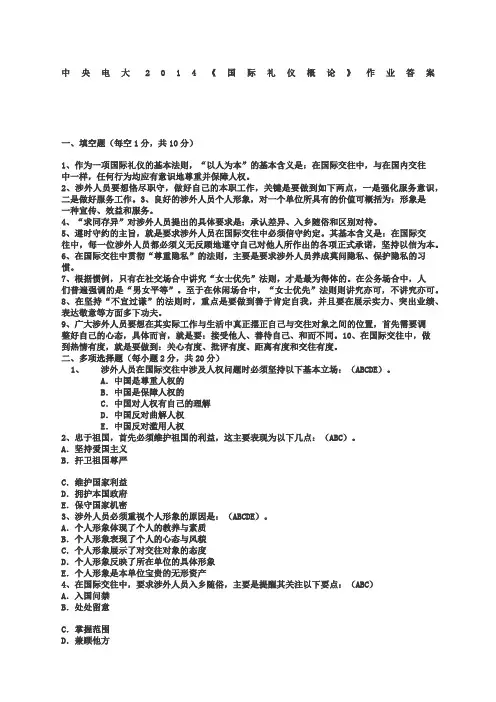
中央电大2014《国际礼仪概论》作业答案一、填空题(每空1分,共10分)1、作为一项国际礼仪的基本法则,“以人为本”的基本含义是:在国际交往中,与在国内交往中一样,任何行为均应有意识地尊重并保障人权。
2、涉外人员要想恪尽职守,做好自己的本职工作,关键是要做到如下两点,一是强化服务意识,二是做好服务工作。
3、良好的涉外人员个人形象,对一个单位所具有的价值可概括为:形象是一种宣传、效益和服务。
4、“求同存异”对涉外人员提出的具体要求是:承认差异、入乡随俗和区别对待。
5、遵时守约的主旨,就是要求涉外人员在国际交往中必须信守约定。
其基本含义是:在国际交往中,每一位涉外人员都必须义无反顾地遵守自己对他人所作出的各项正式承诺,坚持以信为本。
6、在国际交往中贯彻“尊重隐私”的法则,主要是要求涉外人员养成莫问隐私、保护隐私的习惯。
7、根据惯例,只有在社交场合中讲究“女士优先”法则,才是最为得体的。
在公务场合中,人们普遍强调的是“男女平等”。
至于在休闲场合中,“女士优先”法则则讲究亦可,不讲究亦可。
8、在坚持“不宜过谦”的法则时,重点是要做到善于肯定自我,并且要在展示实力、突出业绩、表达敬意等方面多下功夫。
9、广大涉外人员要想在其实际工作与生活中真正摆正自己与交往对象之间的位置,首先需要调整好自己的心态,具体而言,就是要:接受他人、善待自己、和而不同。
10、在国际交往中,做到热情有度,就是要做到:关心有度、批评有度、距离有度和交往有度。
二、多项选择题(每小题2分,共20分)1、涉外人员在国际交往中涉及人权问题时必须坚持以下基本立场:(ABCDE)。
A.中国是尊重人权的B.中国是保障人权的C.中国对人权有自己的理解D.中国反对曲解人权E.中国反对滥用人权2、忠于祖国,首先必须维护祖国的利益,这主要表现为以下几点:(ABC)。
A.坚持爱国主义B.扞卫祖国尊严C.维护国家利益D.拥护本国政府E.保守国家机密3、涉外人员必须重视个人形象的原因是:(ABCDE)。
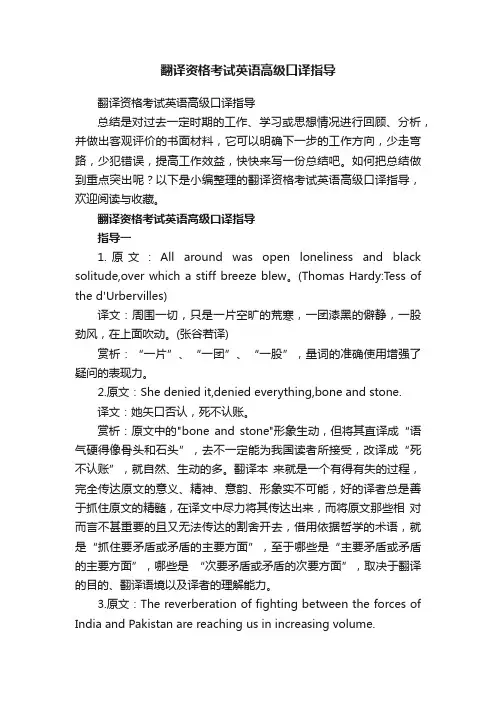
翻译资格考试英语高级口译指导翻译资格考试英语高级口译指导总结是对过去一定时期的工作、学习或思想情况进行回顾、分析,并做出客观评价的书面材料,它可以明确下一步的工作方向,少走弯路,少犯错误,提高工作效益,快快来写一份总结吧。
如何把总结做到重点突出呢?以下是小编整理的翻译资格考试英语高级口译指导,欢迎阅读与收藏。
翻译资格考试英语高级口译指导指导一1.原文:All around was open loneliness and black solitude,over which a stiff breeze blew。
(Thomas Hardy:Tess of the d'Urbervilles)译文:周围一切,只是一片空旷的荒寒,一团漆黑的僻静,一股劲风,在上面吹动。
(张谷若译)赏析:“一片”、“一团”、“一股”,量词的准确使用增强了疑问的表现力。
2.原文:She denied it,denied everything,bone and stone.译文:她矢口否认,死不认账。
赏析:原文中的"bone and stone"形象生动,但将其直译成“语气硬得像骨头和石头”,去不一定能为我国读者所接受,改译成“死不认账”,就自然、生动的多。
翻译本来就是一个有得有失的过程,完全传达原文的意义、精神、意韵、形象实不可能,好的译者总是善于抓住原文的精髓,在译文中尽力将其传达出来,而将原文那些相对而言不甚重要的且又无法传达的割舍开去,借用依据哲学的术语,就是“抓住要矛盾或矛盾的主要方面”,至于哪些是“主要矛盾或矛盾的主要方面”,哪些是“次要矛盾或矛盾的次要方面”,取决于翻译的目的、翻译语境以及译者的理解能力。
3.原文:The reverberation of fighting between the forces of India and Pakistan are reaching us in increasing volume.译文:印度和巴基斯坦两国部队的杀伐声一阵紧似一阵传到我们这里来。
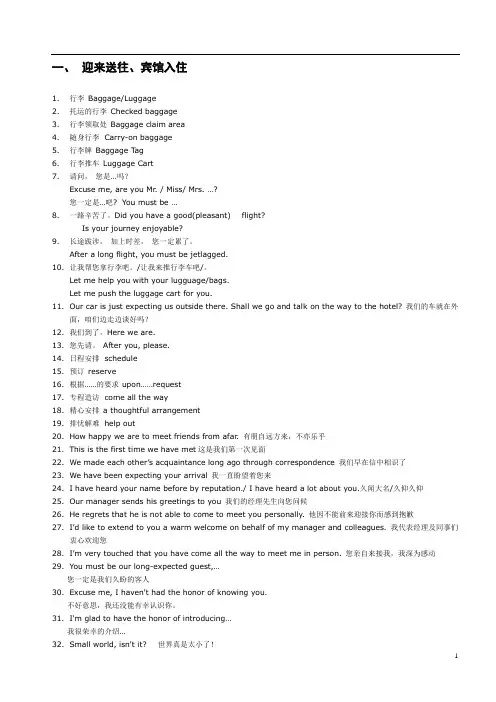
一、迎来送往、宾馆入住1.行李Baggage/Luggage2.托运的行李Checked baggage3.行李领取处Baggage claim area4.随身行李Carry-on baggage5.行李牌Baggage T ag6.行李推车Luggage Cart7.请问,您是…吗?Excuse me, are you Mr. / Miss/ Mrs. …?您一定是…吧? You must be …8.一路辛苦了。
Did you have a good(pleasant) flight?Is your journey enjoyable?9.长途跋涉,加上时差,您一定累了。
After a long flight, you must be jetlagged.10.让我帮您拿行李吧。
/让我来推行李车吧/。
Let me help you with your lugguage/bags.Let me push the luggage cart for you.11.Our car is just expecting us outside there. Shall we go and talk on the way to the hotel? 我们的车就在外面,咱们边走边谈好吗?12.我们到了。
Here we are.13.您先请。
After you, please.14.日程安排schedule15.预订reserve16.根据……的要求upon……request17.专程造访come all the way18.精心安排a thoughtful arrangement19.排忧解难help out20.How happy we are to meet friends from afar. 有朋自远方来,不亦乐乎21.This is the first time we have met这是我们第一次见面22.We made each other’s acquaintance long ago through correspondence 我们早在信中相识了23.We have been expecting your arrival 我一直盼望着您来24.I have heard your name before by reputation./ I have heard a lot about you.久闻大名/久仰久仰25.Our manager sends his greetings to you 我们的经理先生向您问候26.He regrets that he is not able to come to meet you personally. 他因不能前来迎接你而感到抱歉27.I’d like to extend to you a warm welcome on behalf of my manager and colleagues. 我代表经理及同事们衷心欢迎您28.I’m very touched that you have come all the way to meet me in person. 您亲自来接我,我深为感动29.You must be our long-expected guest,…您一定是我们久盼的客人30.Excuse me, I haven't had the honor of knowing you.不好意思,我还没能有幸认识你。
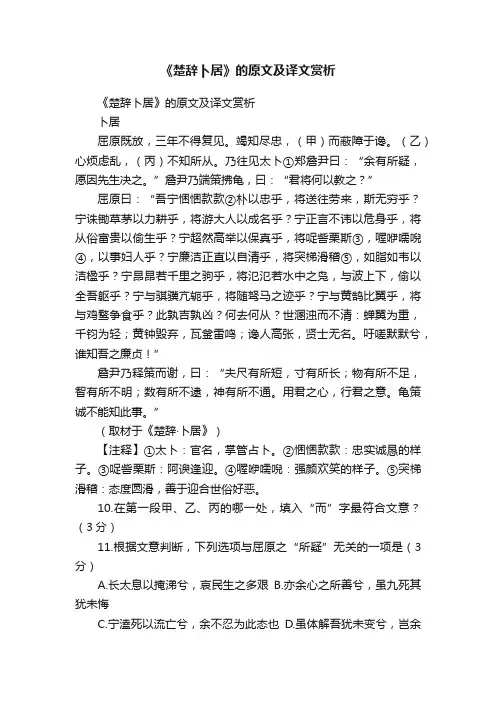
《楚辞卜居》的原文及译文赏析《楚辞卜居》的原文及译文赏析卜居屈原既放,三年不得复见。
竭知尽忠,(甲)而蔽障于谗。
(乙)心烦虑乱,(丙)不知所从。
乃往见太卜①郑詹尹曰:“余有所疑,愿因先生决之。
”詹尹乃端策拂龟,曰:“君将何以教之?”屈原曰:“吾宁悃悃款款②朴以忠乎,将送往劳来,斯无穷乎?宁诛锄草茅以力耕乎,将游大人以成名乎?宁正言不讳以危身乎,将从俗富贵以偷生乎?宁超然高举以保真乎,将哫訾栗斯③,喔咿嚅唲④,以事妇人乎?宁廉洁正直以自清乎,将突梯滑稽⑤,如脂如韦以洁楹乎?宁昂昂若千里之驹乎,将氾氾若水中之凫,与波上下,偷以全吾躯乎?宁与骐骥亢轭乎,将随驽马之迹乎?宁与黄鹄比翼乎,将与鸡鹜争食乎?此孰吉孰凶?何去何从?世溷浊而不清:蝉翼为重,千钧为轻;黄钟毁弃,瓦釜雷鸣;谗人高张,贤士无名。
吁嗟默默兮,谁知吾之廉贞!”詹尹乃释策而谢,曰:“夫尺有所短,寸有所长;物有所不足,智有所不明;数有所不逮,神有所不通。
用君之心,行君之意。
龟策诚不能知此事。
”(取材于《楚辞·卜居》)【注释】①太卜:官名,掌管占卜。
②悃悃款款:忠实诚恳的样子。
③哫訾栗斯:阿谀逢迎。
④喔咿嚅唲:强颜欢笑的样子。
⑤突梯滑稽:态度圆滑,善于迎合世俗好恶。
10.在第一段甲、乙、丙的哪一处,填入“而”字最符合文意?(3分)11.根据文意判断,下列选项与屈原之“所疑”无关的一项是(3分)A.长太息以掩涕兮,哀民生之多艰B.亦余心之所善兮,虽九死其犹未悔C.宁溘死以流亡兮,余不忍为此态也D.虽体解吾犹未变兮,岂余心之可惩渔父屈原既放,游于江潭,行吟泽畔;颜色憔悴,形容枯槁。
渔父见而问之曰:“子非三闾大夫与?何故至于斯?” 屈原曰:“举世皆浊我独清,众人皆醉我独醒,是以见放。
” 渔父曰:“圣人不凝滞于物,而能与世推移。
世人皆浊,何不淈其泥而扬其波?众人皆醉,何不铺其糟而歠其醨?何故深思高举,自令放为?”屈原曰:“吾闻之:新沐者必弹冠,新浴者必振衣,安能以身之察察,受物之汶汶者乎?宁赴湘流,葬身于江鱼之腹中,安能以皓皓之白,而蒙世俗之尘埃乎?”渔父莞尔而笑,鼓枻而去。
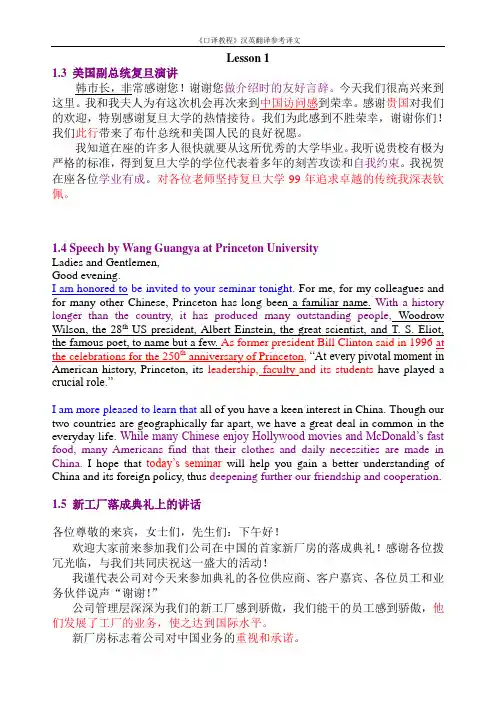
Lesson 11.3 美国副总统复旦演讲韩市长,非常感谢您!谢谢您做介绍时的友好言辞。
今天我们很高兴来到这里。
我和我夫人为有这次机会再次来到中国访问感到荣幸。
感谢贵国对我们的欢迎,特别感谢复旦大学的热情接待。
我们为此感到不胜荣幸,谢谢你们!我们此行带来了布什总统和美国人民的良好祝愿。
我知道在座的许多人很快就要从这所优秀的大学毕业。
我听说贵校有极为严格的标准,得到复旦大学的学位代表着多年的刻苦攻读和自我约束。
我祝贺在座各位学业有成。
对各位老师坚持复旦大学99年追求卓越的传统我深表钦佩。
1.4 Speech by Wang Guangya at Princeton UniversityLadies and Gentlemen,Good evening.I am honored to be invited to your seminar tonight. For me, for my colleagues and for many other Chinese, Princeton has long been a familiar name. With a history longer than the country, it has produced many outstanding people,Woodrow Wilson, the 28th US president, Albert Einstein, the great scientist, and T. S. Eliot, the famous poet, to name but a few. As former president Bill Clinton said in 1996 at the celebrations for the 250th anniversary of Princeton,“At every pivotal moment in American history, Princeton, its leadership, faculty and its students have played a crucial role.”I am more pleased to learn that all of you have a keen interest in China. Though our two countries are geographically far apart, we have a great deal in common in the everyday life. While many Chinese enjoy Hollywood movies and McDonald’s fast food, many Americans find that their clothes and daily necessities are made in China. I hope that today’s seminar will help you gain a better understanding of China and its foreign policy, thus deepening further our friendship and cooperation.1.5 新工厂落成典礼上的讲话各位尊敬的来宾,女士们,先生们:下午好!欢迎大家前来参加我们公司在中国的首家新厂房的落成典礼!感谢各位拨冗光临,与我们共同庆祝这一盛大的活动!我谨代表公司对今天来参加典礼的各位供应商、客户嘉宾、各位员工和业务伙伴说声“谢谢!”公司管理层深深为我们的新工厂感到骄傲,我们能干的员工感到骄傲,他们发展了工厂的业务,使之达到国际水平。
迎来送往Protocol RoutineWords and expressions1.到机场接人to meet …at the airport2.时差jet leg3.倒时差to recover from the jet leg4.提取行李to claim baggage/luggage5.海关Customs6.进行海关检查to go through the Customs7.日程,活动安排schedule/itinerary8.初步拟定的日程安排tentative schedule/ itinerary9.您一定是我们期盼已久的客人……You must be our long-expected guest,…10.很高兴欢迎你们来到… It’s my pleasure to welcome you to…11.欢迎来中国/北京/南京!Welcome to China/Beijing/Nanjing!12.欢迎欢迎,您一路辛苦了。
Welcome to…Did you have a nice trip? /How was thejourney?13.坐了这么长时间的飞机,你累吗?How are you after such a long flight?14.谢谢您专程来接我。
Thank you very much for coming all the way to meet me.15.不用谢,这是我们应该做的。
It is my pleasure.16.我们又见面了!Small world, isn’t it?17.久仰、久仰!I have long been looking forward to meeting you.18.久违、久违!I haven’t seen you for ages/for a long time. It’s been such a long timesince we met last.19.久闻大名!I have long heard of you.20.我们上车吧。
接机A:Excuse me, sir, are you Mr. Johnson form the United StatesB:是的 ,我是美国来的大卫·约翰逊 ,你必定是张先生了。
A:Yes, I ’ m Zhang Ming. , I have been expecting you.B:感谢你来接我。
就叫我大卫吧 ,称号名字比称号姓要更和蔼一些。
A:OK. Welcome to Shanghai. Did you enjoy your tripB:还能够 ,可是比预期的晚到了。
下大雨 ,班机推延了 ,我们在机场等到天气转好才腾飞。
总的来说 ,飞翔天气还不错。
A: Well, you arrived safe and sound. I suppose you must be very tired after the long trip, so we will drive directly to the hotel.B:是的 ,是很累了。
但我明日就能恢复。
A:I hope so. We shall give you a dinner party for tomorrow evening.B:你们真好 ,我很愿意前去。
A:Good. Mr. Wang, our general manger, sends his greetings to you, but regrets that he is unable to come to meet you in person.B:没关系的。
A:I hope you’havell a pleasant stay here. If there ’anythings you need, please letme know. I ’ ll getluggage cart and meet you over there at the carrousel.B:感谢 ,你拿这个行李包 ,我来提箱子。
口译常用词汇及表达一、欢送光临〔一〕商务职衔1.总裁/会长/理事长President2.董事会主席/董事长Chairman (board of directors)3.董事Director4.执行董事 E*ecutive Director5.总干事Director-General6.理事Trustee/Council Member7.总监/主任Director8.经理Manager9.总经理General Manager〔GM〕10.副总经理Assistant General Manager11.总经理助理General Manager Assistant12.公关部经理 PR (Public Relations) Manager13.销售部经理 Sales Manager14.市场部经理Marketing Manager15.生产部经理Production Manager16.研发部经理R & D (Research and Development) Manager17.厂长Factory Managing Director18.车间主任Workshop Manager19.高级工程师Senior Engineer20.助理工程师Assistant Engineer21.首席执行官/总裁C.E.O (Chief E*ecutive Officer)22.首席财务官/财务总监C.F.O (Chief Financial Officer)23.财务主管Financial Controller24.高级会计师Senior Accountant25.会计师Accountant26.助理会计师Assistant Accountant27.注册会计师Certified Public Accountant(CPA)28.会计员Treasurer29.出纳员Teller30.首席信息官/ 咨讯总监C.I.O (Chief Information Officer)31.首席营运官/ 运营总监C.O.O (Chief Operation Officer)32.技术员Technician33.程序员Programmer34.设计师Designer35.机械师Mechanic 36.推销员Salesman / Salesperson37.采购员Purchaser38.部长Minister39.副部长 Vice-Minister40.部长助理 Assistant Manager41.省长Governor42.市长Mayor43.副〔省长/市长〕Vice- / Deputy44.常务副〔省长/市长〕Senior (Vice-Governor / Vice-Mayor)45.厅长/司长Director-General, …Department46.局长Director-General, … Bureau47.处长 Director, ... Division48.科长 Section Chief49.副〔厅长/司长/局长/处长〕deputy〔二〕机场词汇1.国际航班 International Flight2.国内航班 Domestic Flight3.航班 Flight Number4.起飞/抵达时间Departure/arrival time5.机场大楼Terminal Building6.航班/飞机资料显示牌Flight InformationBoard7.候机室Departure Lounge8.贵宾室VIP Room9.登记柜台Check-in Counter10.问讯处Information Desk11.办理出境/入境/海关手续to go through/plete the (e*it/entry/customs)formalities12.出境登记卡Departure Card13.入境登记卡Landing Card14.平安检查Security Check15.护照检查处Passport Control16.签证种类Type of visa17.一次性/屡次性入境签Single-entry/Multipleentry visa18.再入境签证Re-entry visa19.旅行/居留签证Travel/Residence visa20.出境/入境/过境/访问签证E*it/Entry/Transit/Visitor’s visa21.签证有效期validity of visa22.入境日期及口岸date and port of entry23.抵达/出境日期date of arrival/departure24.婚配状况marital status25.居留事由/期限purpose/duration of stay26.旅行/居住证travel/residence permit27.海关申报处 Customs Service Area28.海关the Customs29.海关关员customs officer30.货币申报 currency declaration31.关税customs duty32.免税店duty-free shop33.免税商品 duty-free items34.增值税VAT (Value-added Ta*)35.需课税商品 dutiable goods / articles36.填写报关单to fill in/out the declarationform37.个人物品personal effects38.进/出口许可证 import/e*port permit39.违反海关规定to violate customsregulations;against customs regulations40.走私to smuggle; smuggling41.照章纳税to pay customs duty according tothe regulations42.机票Air Ticket43.开场检票Checking-in44.开场登机Boarding45.停顿登机Closing46.登机牌Boarding Pass47.单程机票 One-Way Ticket48.来回机票 Round-Trip Ticket49.头等舱 First Class50.商务舱 Business Class51.经济舱 Economy Class52.盥洗室 Lavatory53.使用中 Occupied54.无人Vacant55.女空服员 Stewardess56.男空服员 Steward57.行李 Baggage/Luggage58.托运的行李 Checked baggage59.行李领取处 Baggage claim area60.认领行李claim one’s baggage61.行李领取凭证claim check62.随身行李 Carry-on baggage63.行李牌 Baggage Tag64.行李推车Luggagecart/trolley/handcart/pushcart 65.日程安排;旅行路线schedule; itinerary 〔三〕酒店入住1.reception desk 前台2.vacant(spare) room 空房3.single room单人房4.double room 双人间5.standard suite 普通套房6.lu*ury suite 豪华套房7.presidential suite 总统套房8. a double room with a bath 带浴室的双人房9.wake-up call 叫醒10.入住 check in11.退房check out〔四〕表示欢送1.到机场接人to meet sb. at the airport2.对不起,您是来自……的……吗?我叫……,是……〔单位〕的……〔职务〕。
Unit1Phrase InterpretingA1. to recover from the jet lag2. thoughtful arrangement3. hospitality4. souvenir5. accommodations6. to claim baggage7. to proceed through the Customs 8. itinerary9. farewell speech 10. to adjust to the time difference1.倒时差2.周到的安排3.热情好客4.纪念品5.食宿6.提取行李7.进行海关检查8.活动安排9.告别词10.适应时差B1.为……设宴洗尘2.向……告别3.不远万里来到…4.很荣幸……5.久仰大名6.欢迎词7.赞美8.回顾过去9.展望未来10.美好回忆1. to hold a banquet in honor of...2. to bid farewell to...3. to come all the way to...4. to be/feel honored...5. I have long been looking forward to meeting you.6. a welcoming address7. to pay tribute to 8. to look back9. to look ahead 10. happy memoryDistinguished Guests, Ladies and Gentlemen,Thank you very much for your gracious welcoming speech. China is one of the earliest cradles of civilization and the visit to this ancient nation has long been my dream. This visitwill give me an excellent opportunity to meet old friends and establish new contacts. I wishto say again that I am so delighted and privileged to visit your great country and this lovely town. I am deeply grateful for everything you have done for me since my arrival in China.As an American manager of a Sino-American joint venture for two years, I have to saythat there are differences in business management practice between Chinese and Americans.We are more direct and straightforward than most Chinese colleagues due to our different cultural traditions. I can't say our way of doing business is absolutely superior. After all,there are strong points and weak points in both types of management. In recent years, moreand more American business executives have recognized the strong points of the more humane way of Chinese management.It is a great pleasure that I can exchange views and information with you, and reach common ground here. And I wish to share with you my thoughts on this topic in the days to come. Thank you!尊敬的各位来宾,女士们,先生们:非常感谢你们热情友好的欢迎词。
Introduction(绪论)Unit 1ProtocoI Routine(迎来送往)Long—term Preparation(长期准备)Unit 2Ceremonial Address(礼仪致辞)Short—term Preparation(短期准备)Unit 3Dinner Party(晚宴聚会)Active Listening(积极听入)Unit 4Business TraveI(商务旅行)Discourse Analyzing(语篇分析)Unit 5Business Interview(商务访谈)Note Taking(Ⅰ)(口译笔记1)Unit 6Business Advertisements(商务广告)Note Taking(Ⅱ)(口译笔记2)Unit 7Business Presentations(商务陈述)Note Taking(Ⅲ)(口译笔记3)Unit 8Enterprise Introduction(企业介绍)Retelling(复述)Unit 9Enterprise Culture(企业文化)Public Speaking(公开演讲)Unit 10Marketing & Promotion(市场营销)Paraphrasing(一句多译)Unit 11Business Negotiation(商务谈判)Figures Interpreting (数字口译)Unit 12Business Meeting(商务会议)Idioms Interpreting(成语口译)Unit 13Investment&Profits(投资利润)Fuzzy Interpretation(Ⅰ)(模糊表达1)Unit 14Business Policy(商务政策)Fuzzy Interpretation(Ⅱ)(模糊表达2)Unit 15International Exhibition(国际会展)Fuzzy Interpretation(Ⅲ)(模糊表达3)Unit 16Public Relations(公共关系)Sight interpreting《视译练习)Unit 17Business Strategy(商务策略)Shadowing(影子跟读)Unit 18Transportation & Logistics(交通物流)Quality Assessment (质量评估)U n i t F o u rB u s i n e s s T r a v e lUnit Objectives (单元目标)After reading this unit, you should➢understand the ways to identify the main ideas of the source text.➢find ways to improve your interpreting skills and performance.➢master the basic words and expressions about business travel.➢know some cultural background knowledge about business travel.PreparingI. Interpreting Skills (口译技能)Read the following presentation about discourse analysis and try tounderstand the four speech types and know how to identify the mainideas of the source text. Then complete the following task:1. Listen to the passage, “My first day in New York”, and answer the followingquestions:1). When did the author first arrive in the US?2). What did the author do on the way to his hotel?3). Where did the author get something to eat after his friend had left?4). Why couldn’t he have what he really wanted at the restaurant?5). What did the author do after dinner?2. Listen to the passage again and try to catch more details, and then retell thestory in your own words.Decoding Training (II): Discourse Analysis(语篇分析)Interpreting is to “understand and make understood”. To interpret the speech, one must first understand the message of the speech. However, comprehension(理解)of the source discourse goes beyond the simple recognition of words and linguistic structures. The interpreter shall make an analysis of the source discourse. More importantly, the interpreter shall identify(识别)the speech type and know how to identify the main ideas of the original speeches.Identification of the Speech TypesSpeeches are diversified serving different occasions and purposes. It will be of great help to the interpreters if they know the speaker’s style. In most cases, speeches are prepared beforehand. Therefore, a study of the different types of writing helps an interpreter identify the main idea of a given speech. Following are the basic types of writing.1. Descriptive WritingDescriptive(描述性的)writing involves a great deal of detailed information. A descriptive discussion aimed at providing details of an event, a scene, a procedure, or a situation.This speech type demands a thorough background investigation of the speaker and the relevant situation by the interpreter.2. Narrative WritingNarrative(叙述性的)writing focuses on the development of events. There is no doubt that the interpreter should be very sensitive to dates, time phrases, and verb tenses when a narrative speech is dealt with.3. Expositive WritingExpositive(说明性的)writing deals with its subject matter in such orders as chronological, spatial, comparison, and definition. It would be to the advantage of the interpreter to conduct a background investigation of the speaker and the situation, for that would provide the interpreter with not only thenecessary glossary but also the speaker’s standpoint(立场).4. Persuasive WritingPersuasive(劝说性的)writers always want to make their arguments clear, strong and convincing. When the purpose is to convince, writers of persuasive writing mainly employ two techniques -- induction(归纳)and deduction(推论). Inductive writing starts with specific examples or points to draw a general conclusion, while deductive writing illustrates its thesis at first and then supports and reinforces the thesis through specific examples or subordinate ideas.Identification of the Main IdeasIn the context of interpreting, the main ideas of the source speech can be identified at the sentence level and at the discourse level. Priority should always be attached to identifying the main idea at the sentence level. We argue that identification of main ideas be done on the basis of sentences. Training in identifying the main ideas in interpreting should naturally take place first at the sentence level.1. Sentence LevelThe most important task for an interpreter to identify the main ideas at the sentence level is to discern (洞悉)the subject, verb and object (SVO). It is highly significant for the interpreter to catch the SVO of the sentence while listening to the source text, as the SVO usually carries the major information of the sentence. For example, when listening to “The best way to carry money while traveling is to have a major credit card”, the interpreter is expected to catch “The best way is to have a credit card.” If the interpreter is able to catch the SVO of the sentence, he then will produce a complete sentence with the major information in the target language.2. Discourse LevelThere are also some skills an interpreter might employ on different occasions for grasping the gist (要点)of a speech at the discourse level. In a well-organized speech, the speaker usually explains his point in the first few sentences. Therefore, one of the ways to get the main idea of a speech is to attach priority to the beginning of the speech. Secondly, if the interpreter encounters a speech that is inductively constructed, the interpreter should, to the best of their ability, conduct a study of the speaker's background and viewpoints so that they can follow the speaker's logical guidelines.II. Phrase Interpreting (短语口译)Work on the following words and phrases. Interpret them into Chineseand English respectively.A. English to Chinese1. Have a population of…2. Cover an area of…3. Date back to…4. Have a history of…5. Be situated in…6. The gross domestic product7. Dive-in restaurant 8. Quarantine certificate9. Duration of stay 10. Residence permitB. Chinese to English1、日程安排2、旅行路线3、起飞时间4、机场大楼5、候机室6、贵宾室7、问讯处8、安全检查9、免税店10、个人物品III. Sentence Interpreting (句子口译)Work on the following sentences. Interpret them into Chinese andEnglish respectively.A. English to Chinese1. I believe you're going out of your way for us.2. Wouldn't you like to spend an extra day or two here?3. I'm afraid that won't be possible, much as we'd like to.4. I wonder if it is possible to arrange shopping for us.5. I will keep you posted.B. Chinese to English1. 我特地为你们安排,使你们在北京的逗留愉快。
接机
A: Excuse me, sir, are you Mr. Johnson form the United States
B: 是的,我是美国来的大卫·约翰逊,你一定是张先生了。
A: Yes, I’m Zhang Ming. , I have been expecting you.
B: 谢谢你来接我。
就叫我大卫吧,称呼名字比称呼姓要更亲切一些。
A: OK. Welcome to Shanghai. Did you enjoy your trip
B: 还可以,但是比预期的晚到了。
下大雨,班机推迟了,我们在机场等到天气转好才起飞。
总的来说,飞行天气还不错。
A: Well, you arrived safe and sound. I suppose you must be very tired after the long trip, so we will drive directly to the hotel.
B: 是的,是很累了。
但我明天就能恢复。
A: I hope so. We shall give you a dinner party for tomorrow evening.
B: 你们真好,我很乐意前往。
A: Good. Mr. Wang, our general manger, sends his greetings to you, but regrets that he is unable to come to meet you in person.
B: 没关系的。
A: I hope you’ll have a pleasant stay here. If there’s anything you need, please let me know. I’ll get a luggage cart and meet you over there at the
carrousel.
B: 谢谢,你拿这个行李包,我来提箱子。
A: Everything is here. (I think we have everything.) Our car is waiting outside. Shall we go now B: 好的,走吧。
送机
A: 谢谢您前来送我。
我在这里的确过得很愉快。
B: How time flies! You’ve been in China for t en days. It seems as if it were only yesterday when
I went to meet you at the airport. And now you are leaving.
A: 是啊,对我来说,这是一段最奇妙的经历。
我也希望能够多呆一些时间,但是您知道,
还有很多工作等着我回去做。
B: That’s true. For a business person, business always comes first. I hope to see you again at the next Fair.
A: 我也希望如此。
您来伦敦的话,可别忘了来找我。
B: I certainly will. What’s your impression of China now
A: 嗯,跟我来之前的印象截然不同。
我想现在对于中国和中国文化,我有了更好的了解。
B: I am glad you have enjoyed your stay in China.
A: 对中国知道得越多,就越想去深入地了解她。
还有很多地方我想要去走一走,还有很多东西我想要去看一看。
B: Well, I am looking forward to the opportunity of hosting you here again. A: 您一路给了我很大的帮助。
您陪着我,为我着想,使我这次旅行收获很大。
B: That’s my pleasure. It’s time for me to say goodbye to you.
A: 非常感谢您为我所做的一切。
我会把这次经历珍藏心中。
让我们保持联系。
B: Sure, and I’ll look forward to your next visi t to China.
A: 我一定会来的,我保证。
B: Good bye. And Bon voyage!。